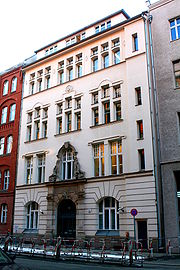
Hochschule für die Wissenschaft des Judentums
Encyclopedia

Rabbi
In Judaism, a rabbi is a teacher of Torah. This title derives from the Hebrew word רבי , meaning "My Master" , which is the way a student would address a master of Torah...
nical seminary
Seminary
A seminary, theological college, or divinity school is an institution of secondary or post-secondary education for educating students in theology, generally to prepare them for ordination as clergy or for other ministry...
, established in Berlin
Berlin
Berlin is the capital city of Germany and is one of the 16 states of Germany. With a population of 3.45 million people, Berlin is Germany's largest city. It is the second most populous city proper and the seventh most populous urban area in the European Union...
in 1872 destroyed by the Nazi government of Germany in 1942. Upon the order of the government, the name was officially changed in 1883 (until 1923) to LEHRANSTALT FÜR DIE WISSENSCHAFT DES JUDENTUMS, and again 1933-1942.
History and Method
Abraham GeigerAbraham Geiger
Abraham Geiger was a German rabbi and scholar who led the founding of Reform Judaism...
, who had been active in establishing Reform Judaism wanted a University for Jewish Studies in Berlin, unable to become part of the University of Berlin, he was involved in 1870 in creating a separate institution. Also involved were David Cassel
David Cassel
David Cassel was a German historian and Jewish theologian.-Life:Cassel was born in Gross-Glogau, a city in Prussian Silesia with a large Jewish community. He graduated from its gymnasium....
, Israel Lewy
Israel Lewy
Israel Lewy was a German-Jewish scholar. He was educated at the Jewish Theological Seminary and the University in Breslau. In 1874 he was appointed docent at the Lehranstalt für die Wissenschaft des Judenthums in Berlin, and in 1883, on the death of David Joël, he was called to the seminary at...
and Heyman Steinthal, the Jewish “intellectuals” and professors at the University of Berlin.
Geiger's "General Introduction to the Science of Judaism," "Introduction to the Biblical Writings," and "Lectures on Pirḳe Abot" were originally delivered as lectures at the seminary.
They taught in the spirit of the Wissenschaft des Judentums movement.
Teachers included some of the best German-Jewish teachers: Hanoch Albeck
Hanoch Albeck
Hanoch Albeck was a professor of Talmud at the Hebrew University in Jerusalem, Israel. He was one of the foremost scholars of the Mishna in his time and he was one of the founders of the scientific approach to the study of the Mishna.Hanoch's father Shalom Albeck, known as the Talmudic scholar,...
, Ismar Elbogen
Ismar Elbogen
Ismar Elbogen was a Jewish-German rabbi, scholar and historian....
, Julius Grünthal, Julius Guttmann
Julius Guttmann
Julius Guttmann , born Yitzchak Guttmann was a German-born rabbi, Jewish theologian, and philosopher of religion.- Biography :...
, Franz Rosenthal
Franz Rosenthal
Franz Rosenthal was the Louis M. Rabinowitz professor of Semitic languages at Yale from 1956 to 1967 and Sterling Professor Emeritus of Arabic, scholar of Arabic literature and Islam at Yale from 1967 to 1985....
, Harry Torczyner, and Leo Baeck.
Moritz Steinschneider
Moritz Steinschneider
Moritz Steinschneider was a Bohemian bibliographer and Orientalist. He received his early instruction in Hebrew from his father, Jacob Steinschneider , who was not only an expert Talmudist, but was also well versed in secular science...
referred to the Hochschule as a "new ghetto of Jewish learning," which he felt could ultimately not produce the standards of scholarship achieved in the university setting .
Officially the institution was not affiliated with a movement or denomination. It sought free inquiry and research without any restrictions. The "Lehranstalt" stood for a conservative Judaism; but its main object is the scientific study of things Jewish, freed as far as possible from denominational disputes. There was no religious test for professors but it was assumed that all of the faculty lived according to the Jewish tradition and were fluent in Hebrew. The school was never dependent on any religious or public organization. Therefore, the board was constantly engaged in raising money from wealthy contributors, sponsors of scholarly “chairs” and scholarships.
In 1872, the first year, there were only 12 students, including four women. In 1921, there were 63 full time and 45 part-time students enrolled in the “Hochschule”. Many of the students came from the Eastern European countries, notably Poland, as graduates of Orthodox Yeshivot.
By 1930-1933 the school had achieved so great a reputation that many non-Jews, especially Christian clergy enrolled.
Alumni
- Solomon Schecter
- Abraham Joshua HeschelAbraham Joshua HeschelAbraham Joshua Heschel was a Polish-born American rabbi and one of the leading Jewish theologians and Jewish philosophers of the 20th century.-Biography:...
- Felix AdlerFelix AdlerFelix Adler was a Jewish professor of political and social ethics, rationalist, popular lecturer, religious leader and social reformer who founded the Ethical Culture movement, and is often considered one of the main influences on modern Humanistic Judaism.- Early life :Felix Adler was born in...
- Samuel Poznanski
- Regina JonasRegina JonasRegina Jonas was a Berlin-born rabbi. In 1935, she became the first Jewish woman to be ordained as a rabbi .-Early life:She became orphaned from her father when she was very young...
- Emil L. Fackenheim
- Arthur BiramArthur BiramArthur Yitzhak Biram was an Israeli philosopher, philologist, and educator.- Biography :...
- Miriam Yalan-ShteklisMiriam Yalan-ShteklisMiriam Yalan-Shteklis was an Israeli writer and poet famous for her children's books. Her surname, Yalan, was an acronym based on her father’s name, Yehuda Leib Nissan.-Biography:...
(1900-84), writer and poet

